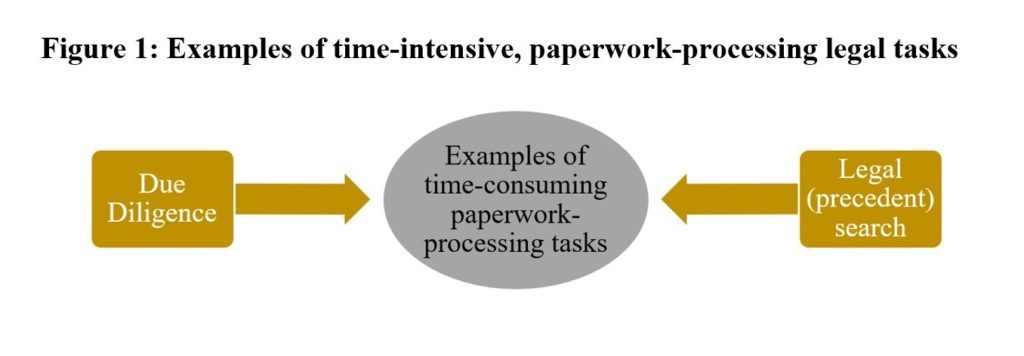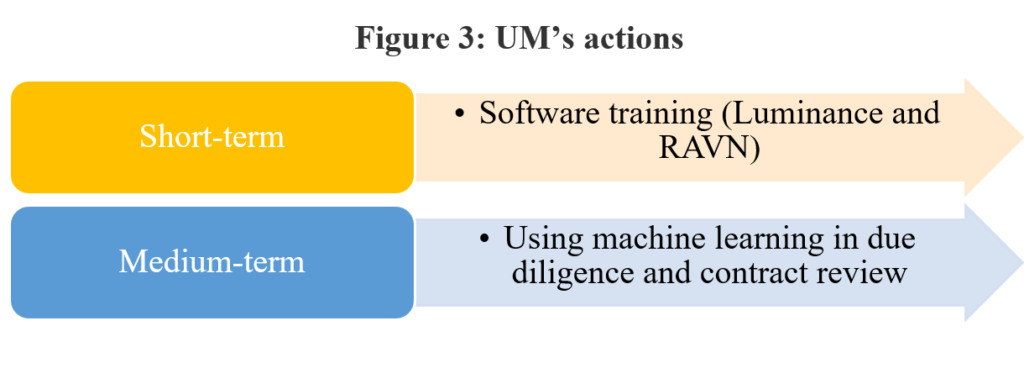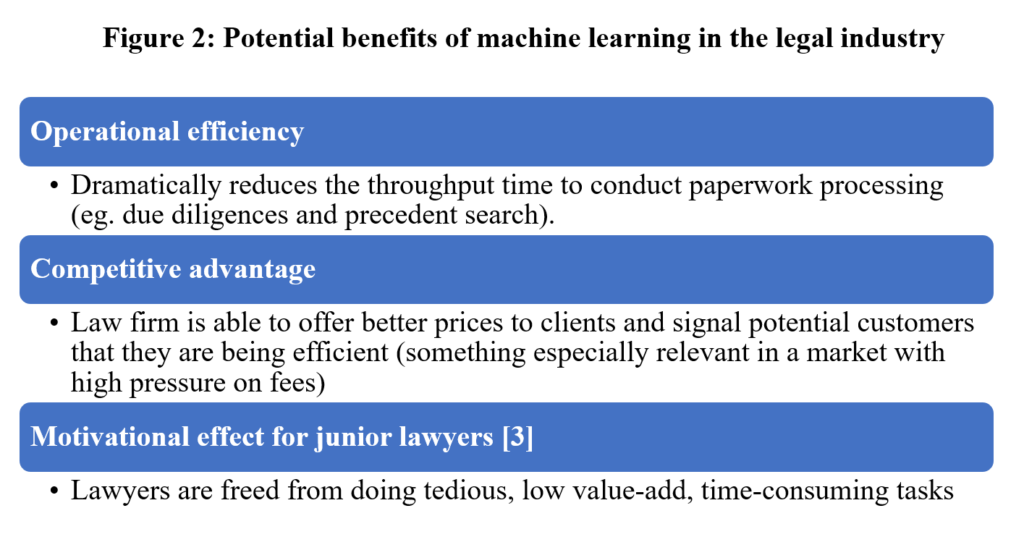Can machines replace lawyers?

With industry experts claiming that AI is a game-changer in the legal industry, what are law firms doing to take advantage of faster document processing provided by machine learning softwares?
1. Introduction
Industry reports estimate that around 100,000 legal-related jobs will be automated by 2036 because of artificial intelligence (“AI”) [1]. How can this be in an industry where human judgement and nuanced reasoning are believed to be the main capabilities needed to deliver excellent client service? What is Uria Menendez (“UM”), one of Spain’s leading corporate law firms, doing to take advantage of the opportunities presented by machine learning?
2. Machine learning: A game changer in the legal industry
The reality is that lawyers in corporate law firms spend a significant part of their time reviewing legal documentation, researching for precedents and drafting and proof-reading contracts. Two examples of time-intensive analytical tasks are:
- Due diligence, the process by which a lawyer, generally in the context of merger or acquisition, reviews hundreds of legal documents of a company to detect issues that are relevant or might affect the price of the transaction [2]. On average, due diligence can account for 50% of the time spent in advising a deal [3].
- Legal search, where attorneys often use word-based searches in legal databases to find precedents to provide legal advice to clients and to prepare for court litigation. Again, finding the precedent with the highest degree of similarity takes hours in reading, analyzing and comparing.

Considering that machine learning is especially effective in analyzing intensive sets of written documents [4], recognizing patterns and evaluating similarity [5], trained algorithms will be able to conduct due diligence and legal research faster (and eventually more reliably) than humans. Plus, besides this operational efficiency, machine learning software provides other important benefits as highlighted in Figure 2.
3. How is UM responding to the opportunities provided by machine learning?
UM is collaborating with two AI companies, Luminance and RAVN. Luminance is an AI platform developed at Cambridge University that enhances efficiency in contract review while RAVN is an AI platform that “automatically reads, interprets and extracts key information from unstructured data” [6]. In the short term, the goal of the alliance with these two companies is to provide training to their machine learning systems to help them familiarize with and understand legal documents in Spanish [6].
In the medium term, after many iterations and once the algorithm has achieved a level of proficiency and reliability, UM expects to apply these technology in due diligence and contract review. As an example, in due diligence context, a trained RAVN software that has learnt the types of documents typically reviewed in a due diligence (eg. company’s bylaws, public deeds, employment contracts, lease agreements, etc.), understood the typical content and structure of each document and learnt the wording/framing of the different clauses within each document should be able to rapidly synthesize information, confirm facts and highlight anomalies [1].
In sum, thanks to the use of machine learning software, UM lawyers will be able to spend less time in less productive tasks and concentrate in high-valued-added tasks [4] such as providing advice to clients, negotiating the terms of a transaction or defending the interests of clients in court [1].
 4. Challenges and further action
4. Challenges and further action
Besides the initiatives taken by UM, the following actions should be considered in light of the transformational impact machine learning will have on the industry. In the short-term UM’s management could:
- a) Consider partnering with research entities to develop machine learning capabilities in precedent search.
- b) Start evaluating the technological aptitudes and abilities of candidates in the recruiting process.
In the medium term, and once the AI systems described are implemented or is about to be implemented, UM should:
- a) Provide extensive training to all lawyers on how to use the machine learning systems.
- b) Update and retrain the software on an ongoing basis, given that the results improve as more and more training data is fed into the system [7].
- c) Consider alternative training mechanisms for junior lawyers. Although due diligences might be tedious, they are an important learning tool for junior lawyers, who are soon exposed to a variety of legal documents, and who develop their legal judgement by conducting due diligence [8]. With the use of machine learning software, alternative options to train and develop junior lawyers will be needed.
In conclusion, machine learning algorithms will help lawyers process and review paperwork much faster. Some analysts consider that time spent in document review can fall by 80% [3]. Will this efficiency improvement reduce jobs in the legal industry? Will this enable better work-life balance of lawyers? Will law firms offer lower prices because of operational improvement? Will these lower prices incentivize the demand for legal services (offsetting AI’s negative effects on jobs)? Will robots eventually be able to write documents and defend arguments in court?
(786)
[1] “How AI And Machine Learning Are Transforming Law Firms And The Legal Sector”, Forbes, May 2018, https://www.forbes.com/sites/bernardmarr/2018/05/23/how-ai-and-machine-learning-are-transforming-law-firms-and-the-legal-sector/#5c5cc0b332c3, accessed November 2018
[2] “Life as a Lawyer”, The Princeton Review, https://www.princetonreview.com/law-school-advice/life-as-a-lawyer, accessed November 2018
[3] “Law firms climb aboard the AI wagon”, The Economist, 12 July 2018, https://www.economist.com/business/2018/07/12/law-firms-climb-aboard-the-ai-wagon, accessed November 2018
[4] H.J. Wilson, S. Sachdev, and A. Alter. “How companies are using machine learning to get faster and more efficient”. Harvard Business Review Digital Articles (May 3, 2016).
[5] A. Fedyk. “How to tell if machine learning can solve your business problem”. Harvard Business Review Digital Articles (November 15, 2016).
[6] “Uria Menendez’s artificial intelligence project underway”, Uria Menendez, https://www.uria.com/en/actualidad/Noticias.html?id=1061, accessed November 2018
[7] E. Brynjolfsson and A. McAfee. “What’s driving the machine learning explosion?” Harvard Business Review Digital Articles (July 18, 2017).
[8] “The Rise of Artificial Intelligence and its Impact on General Counsel”, Lexology, https://www.lexology.com/library/detail.aspx?g=224ca9b8-5377-4bca-bdb8-728f702f2f32, accessed November 2018





One of the biggest (and relatively unsolved) challenges in machine learning today is summarizing and “reading between the lines”. Law cases have so many next-level inferences required that are not immediately captured in the words alone, and machines generally are terrible at identifying what’s important in a body of text. It might be some time before machines can contribute meaningfully in the ways you’re describing.
Another application of ML in the future might be scanning security tapes for similar faces – also a very hard problem, but with awesome implications!
Machine learning will definitely be a utilized much more in the legal industry, there is just so much manual labor work that can be automated, specifically as you stated due diligence and legal research. There is actually a company that claims it already reached more reliable analysis of NDA’s from its algorithm than from actual human lawyers [1].
But this is a good thing for the industry itself, right now lawyers spend much of their times on these daunting tasks. In the future, lawyers will just use the AI as an assisting tool and will be free for higher quality of work which requires more emotional intelligence (dealing with a customer, counseling, etc.) a key quality that is very hard to replicate by machines for the time being.
Regarding the fees in the industry, legal firms will have to adapt and significantly lower their prices if they want to stay competitive, sooner or later the companies that create these algorithms will gain the general public’s trust with better (or even good enough) results and will be able to charge much less money for the tasks such as of analyzing generic contract.
[1] https://www.lawgeex.com/AIvsLawyer/
I do not believe that machine learning algorithms will reduce or eliminate jobs in the legal industry. This is because the human element and judgment required in this field cannot be understated. However, AI could instead increase jobs because it would make becoming a lawyer more attainable as potential law students would not necessarily have to gain admission to top law programs. Artificial intelligence can also perhaps democratize lawyer’s ability to perform due diligence, document review and research.
Machine learning in this context may in fact hurt work life balance because access to artificial intelligence may compell lawyers to leverage as much information as possible to defend their case rather than prioritize what information is necessary. More information at one’s disposal isn’t always better.
I think law firms may be forced to reduce prices because the supply and demand nature of the industry could change as increased competition will ultimately lead to lower prices.